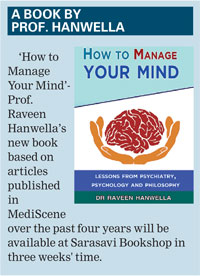Facing adversity:Vital lessons from psychology
What progress we are making. In the Middle Ages they would have burnt me. Now they are content with burning my books – Sigmund Freud
All of us have to face adversity at one time or the other, at times expected and at other times unexpected. We have in our own ways faced such adversity and survived. Can we learn scientific ways of coping with hard times and thereby do so more efficiently? Today I will discuss two such methods from psychology.
The first is from Martin Seligman, Professor of Psychology in the University of Pennsylvania,the founding father of positive psychology. In his book Authentic Happiness, he says that our ability to deal with adversity is determined by 3 Ps – personalization, pervasiveness and permanence.
 Personalization is attributing blame for adversity to ourselves and ignoring external factors that contributed to the event. For example, if you just failed an important examination you may believe that you are wholly to blame for the disaster and ignore mitigating factors such as illness, time pressure or the high standards of the examination.
Personalization is attributing blame for adversity to ourselves and ignoring external factors that contributed to the event. For example, if you just failed an important examination you may believe that you are wholly to blame for the disaster and ignore mitigating factors such as illness, time pressure or the high standards of the examination.
Pervasiveness is believing that a problem will affect all areas of our life instead of only the specific problem area. In the examination failure example, you may believe the result reflects your abilities in all areas of your life and that you have failed not only as a student but as a parent or child.
Permanence is thinking that a bad situation will last forever. Again, to take the failed examination example you may believe that in future examinations too you will suffer the same fate.
How do you go about changing the 3Ps view of life? Well, you reverse it. Instead of thinking that a bad event is personal, pervasive and permanent, think that it is impersonal, specific and temporary. Let’s imagine that you have lost your job. Instead of thinking that I am not a good enough person or that there is something wrong with me (personal), I am a bad parent (pervasive) and I will never get another job (permanent), change your thinking to, my company was struggling, my skills did not match the needs of the company (impersonal), this does not apply to my skills as a parent (specific) and I will find a job soon (temporary).
Sheryl Sandberg is the Chief Operating Officer of Facebook. In 2015 her husband died suddenly of a heart attack while on vacation. In a commencement speech at Berkeley University in 2016, she refers to Martin Seligman’s 3 Ps and how the psychological insights helped her cope with her husband’s death. Initially, she blamed herself for not detecting her husband’s heart disease. Later, on reflection, she realized that she, an economics major, could not have identified something which even her husband’s doctors had missed.
 She went back to work at Facebook 10 days after her bereavement. At first, she was overwhelmed by grief and felt she could not carry on but later realised that she could still function competently as the COO and that her professional life could still be rewarding and worthwhile. A few months after her spouse’s death Sandberg felt that her grief would last for ever but later on realised that “we should accept our feelings — but recognize that they will not last forever.”
She went back to work at Facebook 10 days after her bereavement. At first, she was overwhelmed by grief and felt she could not carry on but later realised that she could still function competently as the COO and that her professional life could still be rewarding and worthwhile. A few months after her spouse’s death Sandberg felt that her grief would last for ever but later on realised that “we should accept our feelings — but recognize that they will not last forever.”
So, the next time you have an adversity try the 3 Ps or rather the reverse and you will be better able to cope with the problem.
The next method I want to talk about is called reframing. Have you ever had a picture that did not look good on the wall? Then you reframed it and the same picture looked great. The picture remains the same but the frame makes a big difference to how it looks. We can do a reframe psychologically too. Thoughts shape our emotions and emotions shape our behaviour. If you want to change a habitual way of thinking or behaviour you have to start with your thoughts. The brain is like a muscle with different parts. Depending on what part you exercise that part becomes stronger and bigger. This is not a mere hypothesis but demonstrated by research.
In a study on London cab drivers who need to memorise a mass of detail about the maze of London road. They were found to have bigger hippocampi (a part of the brain important for memory) compared to bus drivers who only had to follow a set route.
 Let us try an exercise in reframing. Imagine that you are telling a great story to a friend but he appears bored and distracted, frequently checking his phone. You immediately rush to the conclusion that you are a bore and an uninteresting character and feel down for the rest of the day. What are the steps in a cognitive reframe? First, pay attention to the train of thoughts that is pushing you into a negative mood state. Second, consider alternative possibilities. In the given example, consider could your friend have been expecting an important call, could there be a problem in his life you are not aware of or perhaps he is just in a rush and has an important appointment to keep. But what is the reality you might question? Well, the truth, if there is one, is immaterial. The problem is that your brain follows a habitual negative path and ends up distressed.
Let us try an exercise in reframing. Imagine that you are telling a great story to a friend but he appears bored and distracted, frequently checking his phone. You immediately rush to the conclusion that you are a bore and an uninteresting character and feel down for the rest of the day. What are the steps in a cognitive reframe? First, pay attention to the train of thoughts that is pushing you into a negative mood state. Second, consider alternative possibilities. In the given example, consider could your friend have been expecting an important call, could there be a problem in his life you are not aware of or perhaps he is just in a rush and has an important appointment to keep. But what is the reality you might question? Well, the truth, if there is one, is immaterial. The problem is that your brain follows a habitual negative path and ends up distressed.
What you do in reframing is to think of the more benign possibilities and make this a habit. The picture remains the same but the frame is different and the picture looks different too. And don’t you feel good looking at a well framed picture?
As Richard Branson said, “Whenever I am faced with a problem, I try to reframe it as an opportunity.”


